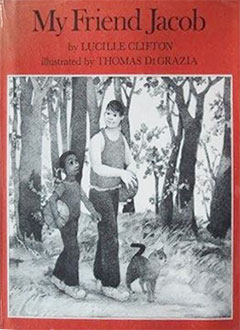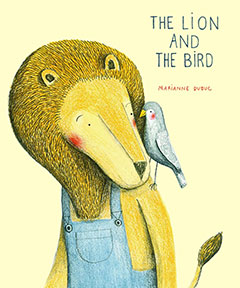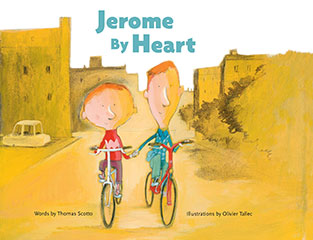Jackie: We two friends have been doing this blog since 2015. Yet, we’ve never done a column on books about friends. We know there are many, and many classics, such as the always-satisfying Frog and Toad books by Arnold Lobel, or William Steig’s Amos and Boris, or James Marshall’s George and Martha. But today we want to look at three, one by one of our favorite writers Lucille Clifton. (We are still hoping — campaigning — for a re-issue of her out-of-print Everett Anderson books.) And two newer “friend” books.
 My copy of Lucille Clifton’s My Friend Jacob is a library copy that became available because a library “withdrew” it from its own collection. I don’t know why anyone would not want this book in their collection. A child narrator tells us: “My best friend lives next door…We do things together, Jacob and me. We love to play basketball together. Jacob always makes a basket on the first try.” (We see that Jacob is taller, older, than the narrator.) …” My mother used to say, ‘Be careful with Jacob and that ball, he might hurt you.’ But now she doesn’t. He knows that Jacob wouldn’t hurt anybody, especially his very very best friend.” And Jacob’s mother once said, “’You don’t have to have Jacob tagging along with you [to the grocery store] like that, Sammy.’ But now she doesn’t. She knows we like to go to the store together. Jacob helps me to carry, and I help Jacob to remember.’” These two friends accept each other for just who they are. Sammy learns the makes and names of cars from Jacob, who knows them all. Jacob needs help remembering what the street lights mean. He needs help remembering to knock before entering Sammy’s house. And the triumphal moment comes when he does remember. “Next day at dinnertime, we were sitting in our dining room when me and my mother and my father heard this real loud knocking at the door. Then the door popped open and Jacob stuck he’s head in./’I’m knocking, Sam!’ he yelled.”
My copy of Lucille Clifton’s My Friend Jacob is a library copy that became available because a library “withdrew” it from its own collection. I don’t know why anyone would not want this book in their collection. A child narrator tells us: “My best friend lives next door…We do things together, Jacob and me. We love to play basketball together. Jacob always makes a basket on the first try.” (We see that Jacob is taller, older, than the narrator.) …” My mother used to say, ‘Be careful with Jacob and that ball, he might hurt you.’ But now she doesn’t. He knows that Jacob wouldn’t hurt anybody, especially his very very best friend.” And Jacob’s mother once said, “’You don’t have to have Jacob tagging along with you [to the grocery store] like that, Sammy.’ But now she doesn’t. She knows we like to go to the store together. Jacob helps me to carry, and I help Jacob to remember.’” These two friends accept each other for just who they are. Sammy learns the makes and names of cars from Jacob, who knows them all. Jacob needs help remembering what the street lights mean. He needs help remembering to knock before entering Sammy’s house. And the triumphal moment comes when he does remember. “Next day at dinnertime, we were sitting in our dining room when me and my mother and my father heard this real loud knocking at the door. Then the door popped open and Jacob stuck he’s head in./’I’m knocking, Sam!’ he yelled.”
Clifton does here what she often does so well — makes a satisfying story out of humble accomplishments. Her moments involve the stuff of all our lives, counting cars, shooting basketballs, remembering to knock. And we cheer for her characters’ achievements. And admire her ability to present, without apology or awkwardness, a kid for whom it is several afternoon’s work to make a birthday card, or practice to remember to knock. Clifton cares about Jacob. And she helps us to share Sammy’s affection for him. I want to live in Lucille Clifton’s world.
Phyllis: Could I live there, too, please? My copy of My Friend Jacob, too, had been removed from a library (I’ve since passed it on to other readers). Clifton’s books honor the lives, struggles, and hearts of the people who were not often found in picture books at the time she wrote. It’s easy to distance ourselves from people who seem different; it takes a friend to see how we are not so different and how we help hold each other up. Sammy is that friend to Jacob, and Jacob is that friend to him.
 Jackie: The Lion and The Bird by Marianne Dubul (translated by Claudia Zoe Bedrick, published by Enchanted Lion Books, 2014) features a lion who has a modest cottage, a garden, and a contented life. One fall day, while working in his garden he spots an injured bird. He bandages the bird’s wing and they both watch as the other birds fly away. Lion invites the bird to spend the winter. “There’s more than enough room for both of us.” The bird eats at Lion’s table, listens by the fire while Lion reads, and sleeps cozily in one of Lion’s slippers. “They spend the winter together, enjoying each day.” And we see them sledding, ice-fishing, Bird tucked snugly in his own place in Lion’s hat. Come spring, Bird flies away with his peers. We see Lion feeling smaller and lonelier. “And so it goes./Life is sometimes like that.” Wordless pictures show Lion resuming his solitary life — empty slippers, eating alone. He grows his garden, fishes, passes the summer. And in the fall, Bird returns! ‘Together we’ll stay warm again this winter.”
Jackie: The Lion and The Bird by Marianne Dubul (translated by Claudia Zoe Bedrick, published by Enchanted Lion Books, 2014) features a lion who has a modest cottage, a garden, and a contented life. One fall day, while working in his garden he spots an injured bird. He bandages the bird’s wing and they both watch as the other birds fly away. Lion invites the bird to spend the winter. “There’s more than enough room for both of us.” The bird eats at Lion’s table, listens by the fire while Lion reads, and sleeps cozily in one of Lion’s slippers. “They spend the winter together, enjoying each day.” And we see them sledding, ice-fishing, Bird tucked snugly in his own place in Lion’s hat. Come spring, Bird flies away with his peers. We see Lion feeling smaller and lonelier. “And so it goes./Life is sometimes like that.” Wordless pictures show Lion resuming his solitary life — empty slippers, eating alone. He grows his garden, fishes, passes the summer. And in the fall, Bird returns! ‘Together we’ll stay warm again this winter.”
This is a quiet, lovely story of kindness, friendship, sharing, and kindness returned. The illustrations so clearly reflect Lion’s emotions. I would love to read this with a child and talk about feelings.
Phyllis: I love how Lion puts Bird tenderly up on top of his mane to keep him warm, covering him with his hat (with appropriate cut-out window) in winter. “Winter doesn’t feel all that cold with a friend,” Dubul writes, and those of us in wintry climates (as I write this there’s an April blizzard blowing outside) especially recognize that warmth. Spring returns, and as the migrating flock of birds fly over, Lion tells Bird he knows Bird must go. And even though “life is sometimes like that,” sometimes life also brings our friends back to us, just as Bird returns and chooses to spend the winter again with Lion. The soft spare art perfectly matches the spare text. Spring’s return is a single flower opening on a double page spread, and a single note on a double page spread heralds Bird’s return. Dubul does not gloss over the sense of loss Lion feels; like Lion, we yearn for Bird’s return, and that absence and yearning makes the return even more satisfying. I love that friendships can survive distance and time.
 Jackie: Jerome By Heart by Thomas Scotto with illustrations by Olivier Tallec (translated from the French by Claudia Zoe Bedrick and Karin Snelson; Enchanted Lion Books, 2018) gives us a story told with humor and poignancy, of two friends who know they are friends. “He always holds my hand./It’s true./Really tight.” And we see two boys, bicycling, holding hands as traffic backs up behind them. And the one driver whose face we can see looks rather grumpy. They are friends everywhere, “On field trips to the art museum,/it’s me he chooses as his buddy.” Rafael loves Jerome. Rafael’s mom likes Jerome, but doesn’t realize that Rafael feels protected by Jerome’s friendship. Rafael’s Dad wishes Jerome would play soccer.
Jackie: Jerome By Heart by Thomas Scotto with illustrations by Olivier Tallec (translated from the French by Claudia Zoe Bedrick and Karin Snelson; Enchanted Lion Books, 2018) gives us a story told with humor and poignancy, of two friends who know they are friends. “He always holds my hand./It’s true./Really tight.” And we see two boys, bicycling, holding hands as traffic backs up behind them. And the one driver whose face we can see looks rather grumpy. They are friends everywhere, “On field trips to the art museum,/it’s me he chooses as his buddy.” Rafael loves Jerome. Rafael’s mom likes Jerome, but doesn’t realize that Rafael feels protected by Jerome’s friendship. Rafael’s Dad wishes Jerome would play soccer.
Jerome is kind — sees Rafael and speaks to him when he’s with other friends, defends Rafael when other kids make fun of him (we don’t know why), and tells “stories that are so good/they seem real…”
When Rafael tells his parents, “I had the best dream last night!/It was good in a Jerome kind of way,” his Dad stares at his shoelaces. His Mom says, “’Eat your cereal, Rafael.’” Rafael replies, “Maybe I’ll just eat my dream on toast! … That way all you’ll hear is crunching/and it won’t bother your ears so much.” And Dad responds, “Now that’s enough!”
Rafael goes to his room, looking for a present for Jerome. He imagines them on vacation together, riding in a race car. “I circle around and around my bed./Around and around my table./Around and around my questions.” At the end he affirms his true friendship, in spite of his parents. “And I say — yes./Rafael loves Jerome./I can say it./It’s easy.” And we cheer for him.
Phyllis: I love this book so much — it’s one of those books that captivated me and insisted I buy it. The title page of Jerome By Heart quotes French poet Jacques Prévert, who wrote the enchanting How to Paint the Portrait of a Bird (illustrated by Mordecai Gerstein, Roaring Brook Press, 2007). Prévert wrote, “And the passers-by pointed fingers at them. But the children who love each other aren’t there for anyone else.”
Jerome and Rafael are “there” for each other. Raphael’s mom says Jerome is polite and charming. “But she never says anything about how warm his smile is. She doesn’t seem to notice that I have a secret hideout there, where I feel protected by Jerome’s two eyes.” Jerome always sees Raphael, even when Jerome is with his friends. What do we really want but to be seen and loved for who we really are? And to love that person back. Raphael says it for us: “’I forget my mom and dad./ I think only about Jerome/ who I know by heart.”
In The Little Prince by Antoine de Saint-Exupéry the prince says, “And now here is my secret, a very simple secret: It is only with the heart that one can see rightly; what is essential is invisible to the eye.” Friends like Sammy and Jacob, Lion and Bird, Jerome and Rafael see what is essential but invisible to the eye. May we all have such friends. May we all be such friends, seeing and knowing each other heart to heart.
P.S. Two of these three books are published by Enchanted Lion, a press that’s bringing out books that quickly become some of our favorite book friends.
